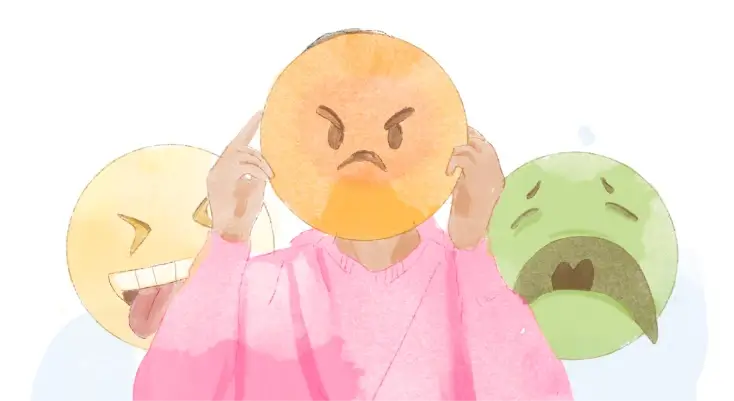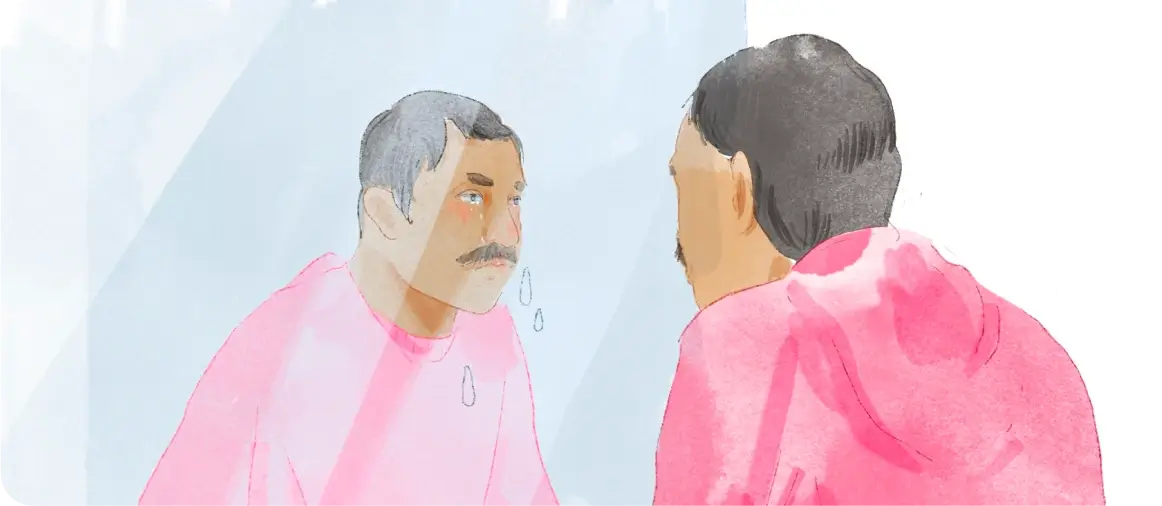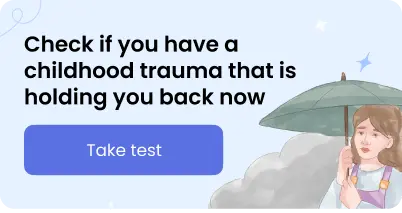“You’re so emotionally distant! You don’t ever talk about how you feel! It’s so hard to live with an emotionally absent person like you.”
Have you ever heard something like that or said it to someone you cared about? If so, you probably experienced difficulties opening up with others, or you are the one who seems emotionally unavailable in relationships.
But why does it happen? Why do some people understand human emotions in entirely different ways? And, more importantly, why do we showcase our feelings differently? Let’s find out.
Emotional unavailability test
Ready to unveil the answer to the question, “Am I emotionally unavailable?” Opt for 1 answer in each question and then calculate the totals.
- How do you feel about sharing your emotions with others?
- I share my feelings openly, fostering deep connections with those I trust. (1 point)
- It isn’t as easy as it might seem. Still, I try to be open even though I often hesitate and feel unsure how others will react. (2 points)
- I keep my feelings locked away. I’m too scared that someone will see the cracks in my armor and use them against me. (3 points)
- In a romantic relationship, how do you approach intimacy?
- I always strive to be fully present, letting my guard down to build something real. (1 point)
- I appreciate intimacy but sometimes feel unsure about how much to share. (2 points)
- A safe distance is more important for me. To open up to a person, I really need to get over myself. (3 points)
- When faced with conflict, how do you typically respond?
- I don’t like to argue with people, so I try to fix the situation ASAP. I tackle the conflict directly and calmly, aiming for a resolution. (1 point)
- I tend to sidestep confrontation at first, but I’ll deal with it once I feel prepared. (2 points)
- True to say, I find it hard to face the problems. So, I tend to shut down or walk away. (3 points)
- How do you handle your partner’s emotional needs?
- I make my loved one’s emotions a top priority and do my best to support them however I can. (1 point)
- I give it my best shot, but sometimes meeting their expectations feels like a challenge. (2 points)
- I frequently feel out of my depth when it comes to understanding or meeting their needs. (3 points)
- How do you feel when someone you care about is upset?
- I feel a strong urge to comfort them and provide support however I can. (1 point)
- It feels a little awkward, but I still do my best to be supportive. (2 points)
- I struggle to handle their feelings and often feel unsure how to help. (3 points)
“Am I emotionally absent?” Results of a test
5-8 points
You share your feelings openly.
What does it mean to be emotionally unavailable? Seems that you don’t know. It’s usually easy for you to unveil your feelings, so you live with an open heart and soul.
Your emotional openness creates space for deep communication, and you’re not afraid to let people see the real you, flaws and all. This ability to connect is a true strength.
9-12 points
You may sometimes feel detached, but being emotionally unavailable isn’t typical for you.
Really, in some cases, you might seem emotionally distant. Maybe you feel uncomfortable with people around you, are too vulnerable to share your emotions, or aren’t in the mood to delve into conversations.
Still, you’re often open enough to let others in and share what’s on your mind. While you may hesitate, you usually express yourself when it truly matters.
13-15 points
You might be emotionally detached quite often.
There are likely times when you feel disconnected, whether from your emotions or those around you. It’s possible that you put up walls because sharing your feelings may feel risky.
You may need to work on lowering your guard. Building emotional availability takes practice, and you can start by letting yourself be vulnerable in smaller, safer moments.
19 signs of emotional unavailability
Supposing you lack commitment and questioning, “How to stop being emotionally unavailable?”
Here’s a checklist of the signs to determine if you appear standoffish. You can also use it to assess whether you have emotionally distant parents, an unavailable partner, or a friend.
- Fear of intimacy
- Sticking to surface-level topics
- Lack of empathy
- Avoiding commitment
- “No” to labels
- Inconsistency
- Rollercoaster of emotions
- Putting less effort
- Extreme independence
- Focus on tasks instead of emotions
- Rationalizing emotions
- Keeping past in a secret
- Avoiding discussions about the future
- Detached body language
- Ghosting
- Defensive responses
- Expressing a lack of trust
- Blaming others
- Chaotic relationships in the past
1. Fear of intimacy
Let’s remember Tony Stark from Marvel movies.
“Genius, billionaire, playboy, philanthropist.” He seemed perfect at first sight. However, Iron Man had an intense fear of intimacy.
Humor and sarcasm were his defense mechanisms for staying emotionally unavailable. These signs were the most noticeable in the first few films, while later, the character took serious steps toward emotional growth.
In reality, emotionally unavailable people also have difficulties with sharing their feelings and thoughts. They might fear being vulnerable and do everything to keep their distance from others.
2. Sticking to surface-level topics
While some people ask themselves, “Why am I so emotional?” or “Why do I trauma dump?” others may have difficulties allowing their hearts to open.
It might feel like hitting a wall whenever starting a heartfelt talk.
- “What is love for you?”
- “What are your biggest fears?”
- “What is the warmest memory from your childhood?”
An emotionally detached person can keep all these questions unanswered.
Moreover, such people also show little physical affection. They may scroll TikTok or Instagram while you’re pouring your heart out.
3. Lack of empathy
What comes to your mind when I ask, “What does it mean to be emotionally unavailable?”
Affection, intimacy, and… Empathy!
Imagine that someone is crying because of work problems. Emotionally absent people may be confused by the display of these tears. It might be difficult for them to understand what happened, put themselves in your shoes, and provide enough support.
Why does it happen? In a nutshell, such people often “turn off” their feelings. And because of this, it’s even more complicated for them to appreciate and satisfy others’ emotional needs.
Insight. Being emotionally unavailable doesn’t always mean a lack of interest. Even if people seem distant, they might care and feel involved. Besides, in many cases, they don’t know how to show this support and attachment.
4. Avoiding commitment
“Too serious” relationships often seem scary for them. Emotionally unavailable people are afraid of getting too close as this way, they try to avoid painful experiences.
Quite often, this behavior stems from the fact that a person didn’t feel safe, supported, and loved in childhood. As a result, such children experience attachment trauma that might negatively influence their ability to build healthy and committed relationships.
The same is true with emotionally distant parents and friends. They may cancel nights out without reason, not initiate communication, and hesitate to book a trip together.
5. “No” to labels
Emotionally withdrawn people often avoid labels, prefer polygamous relationships, and keep going on dates not to turn the next “situationship” into something serious.
If you’re in a relationship with such a person, they delay moving in together or proposing as long as possible.
Sounds like they don’t want to be with you, right? Still, they might be too scared to commit fully. By avoiding serious milestones, they can keep their guard up and maintain emotional distance.
Insight. If someone seeks long-term commitment or, in contrast, looks for polygamous relationships, it may be better to discuss everything from the spot. This will help minimize emotional fluctuations and clarify the situation for everyone.
6. Inconsistency
“No” to labels isn’t the only way to withdraw from vulnerability. “No” to consistent communication is another way to lock the heart.
An emotionally unavailable partner, especially at the beginning of the relationship, can often go silent for a long time. Once they feel that you get too close, they pull away, retreating into silence.
It’s their way of creating a barrier that keeps you from getting too deep into their world.
7. Rollercoaster of emotions
Relationships with an emotionally unavailable person can be pretty challenging, particularly because of inconsistency.
Today, you are happy, while tomorrow, you’ll cry because they can’t understand your emotions and share what they feel.
If you are currently experiencing something like this and questioning, “Why do I like emotionally unavailable guys?” it might be a good idea to contact a therapist. Seeking guidance to navigate these dynamics effectively may positively influence your mental health.
8. Putting less effort
Who usually cooks dinner in your relationships? Who organizes dates? Who suggests doing something together?
If we’re talking about friendship, who’s the one arranging gatherings?
One of the emotional unavailability signs is that a person doesn’t get equally involved in something. This bare minimum effort from a close one might feel painful, but even after discussing a problem, there’s no guarantee that something will change.
Insight. Some people may appear uninterested or distrustful, even when this is not always true. They may be afraid to lose themselves in relationships or have trust issues, making it difficult to open their hearts.
9. Extreme independence
It’s like constantly saying, “I don’t need you.”
Of course, emotionally unavailable people usually don’t state it literally, but their partners can feel something like this through their hyper-independence.
In healthy and open relationships, people tend to share their worries and reach out to loved ones for support. On the other hand, an emotionally detached person can act like a lone wolf, handling everything on their own and rarely seeking help.
They may view reliance on others as a sign of weakness, leaving you feeling shut out, even when they’re beside you.

10. Focus on tasks instead of emotions
Think about how you usually react when feeling lost in life, dealing with work problems, family arguments, or stressful life events.
Most people need to vent their frustrations or seek comfort from loved ones. Still, someone with emotional unavailability can do anything to avoid talking about feelings.
Such people tend to distract themselves by taking on another project, starting a new hobby, or even moving away — anything to escape the pain.
11. Rationalizing emotions
Well, imagine that you need to face your inner world. There’s no way out.
What will your first reaction be:
- Crying, being angry, anxious, or happy, depending on the situation
- Trying to explain your feelings away or make sense of them logically
Being emotionally available means analyzing and downplaying emotions instead of processing them. Logic serves as a shield to avoid vulnerability.
12. Keeping past in a secret
Remember Joe Goldberg from the “You” Netflix series? He’s a prime example of someone who hides key details of his troubled history. Instead of being open about his experiences, Joe often lies about his past.
Emotionally detached people tend to behave this way. By keeping the past a secret, they create an emotional barrier, maintaining a feeling of control over the relationship.
13. Avoiding discussions about the future
While it can be extremely painful, this is how emotionally distant partners might behave. They get uncomfortable when conversations turn to long-term commitments. And while you start building common plans, they may strive for something completely different.
14. Detached body language
Of course, various people need different amounts of physical and emotional space. Yet, when someone consistently shows detached body language — like avoiding eye contact or crossing their arms — it can signal that a person is emotionally distant.
Emotionally unavailable parents might not offer warmth to their children. So, if you experienced a lack of hugs and saw closed-off body language in childhood, it could be because they created an invisible wall between you.
15. Ghosting
It’s about dodging any situation that requires vulnerability or emotional depth. This is especially common when you’re just starting dating or things begin to get serious.
One moment, everything seems fine, and the next — poof — a ghost vanishes into thin air, leaving you wondering if you imagined the whole thing.
Instead of facing feelings head-on, emotionally absent people turn to silence. As a result, you’re hanging in a state of confusion, dwelling on unanswered questions in your head.
16. Defensive responses
Think about an emotionally unavailable mother who stays detached even when her kids have grown up. Here’s what her typical dialogue can look like.
Daughter: “Mom, I’ve been feeling really stressed with everything lately. I just need some advice or support.”
Mom: “Stressed? You don’t even know what stress is. When I was your age, I had three jobs and no one to help me.”
Daughter: “I understand, but I just want to talk about what I’m going through.”
Mom: “Honestly, you’re being too sensitive. People deal with worse things all the time, and they manage. Why can’t you just handle it like everyone else?”
Daughter: “It feels like you don’t want to hear me out.”
Mom: “That’s not true! I just think you’re making it into something bigger than it is.”
There’s no empathy or involvement in such conversations. Emotionally detached people often react defensively, dismissing the feelings of others.
17. Expressing a lack of trust
What about other signs of an emotionally unavailable mother, partner, or friend? They can — consciously or unconsciously — show that they don’t trust you.
Sharing secrets, talking about future plans, or discussing something deeper than today’s lunch isn’t for them. But why?
It’s not about you; it’s about their fear of being let down, getting hurt, or getting too close. And until they will be able to let the walls fall, you won’t be able to do anything with it.
18. Blaming others
“How does it happen?” — you may ask. Let us explain.
Instead of taking ownership of their feelings, emotionally unavailable people shift responsibility onto others. This way, they try to make themselves believe that they aren’t guilty of anything, like anger bursts or lack of empathy, and the problem is in everyone around them.
This is especially harmful in close relationships. Partners or friends may find themselves walking on eggshells. They try not to trigger more blame, while being helpless because they cannot control how the emotionally detached person feels.
19. Chaotic relationships in the past
Please note that this sign doesn’t equal emotional unavailability. A person might have dated a detached partner or experienced a temporary tough time.
Still, if many other signals show that you’re dealing with emotional barriers, chaotic relationships in the past might be another red flag.
Constant breakups or a pattern of short-lived connections can show someone’s inability to form lasting emotional bonds. These chaotic histories often stem from an unwillingness to get too close or express yourself to those around you.
What does “emotionally unavailable” mean?
We all experience this state from time to time. You don’t want to share what’s inside and need personal space to think about your feelings. People may consider you unresponsive, but this feeling goes away quite quickly.
Nevertheless, while this behavior is temporary for most of us, some permanently fear or avoid commitment. This is what being emotionally unavailable means.
Let’s imagine the scenario: Julia and Ben are sitting in a cafe, and she shares exciting news about a recent promotion.
Smiling happily, she raises her eyes and delightfully awaits his reaction. But instead, distracted by content on his phone, Ben changes the subject without looking up. Julia feels hurt and rejected. For the umpteenth time, she realizes the distance between them.
Ben’s behavior may speak to a lack of emotional availability — the ability to talk openly about his feelings.
As you can understand, this meaning strongly bonds with emotional intelligence (EI) — the ability to recognize, evaluate, and control emotions. People who have low EI may seem emotionally absent.
Why am I emotionally unavailable?
You resonate with being emotionally unavailable. Several or all signs mentioned above are about you. Moreover, you feel that it’s tough for you to build deep emotional bonds with others.
Or, you may want to discover why your closest person behaves so distantly.
In any case, discovering the root cause can be the first step toward fostering healthier relationships. So, let’s take this step together.
1. Emotionally unavailable parents
Childhood trauma is one of the main reasons why people develop insecure attachment. An emotionally unavailable mother or father who didn’t offer enough affection or offered affection in a misattuned way could become your role model for future relationships.
Neglect, emotional fluctuations, and parentification trauma could also influence your attachment style.
People who survived adverse childhood experiences (ACEs) might have trouble showing real feelings. This way, they try to avoid experiencing pain.
Now, think about the other situation. Have you ever asked yourself, “Why do I like emotionally unavailable guys?” In fact, this may be a result of childhood trauma or unmet developmental needs.
For instance, if a person grew up with an emotionally unavailable dad, she may seek partners who approach her the same way. Although some people don’t carry this model into adulthood, this situation is quite common.
Do you want to discover whether you have a childhood trauma that may influence your current relations? Take a quick test to get personalized insights and tips to start your self-exploration journey.
2. Painful breakup experience
So, you’ve analyzed your childhood and haven’t found any signs of an emotionally unavailable mother or dad. Moreover, you lived with dedicated and supportive parents in a committed family. So, why is it difficult for you to open up?
Emotional baggage from past experiences doesn’t always come from childhood. You may feel scared to become vulnerable and intimate because of a recent breakup, cheating, physical, emotional, or financial abuse, etc.
A good illustration is that 48.4% of all women and 48.8% of all men in the US have experienced psychological aggression by an intimate partner. So, if you or your loved ones are emotionally absent, it could stem from negative experiences from the past.
3. Mental health conditions
Finally, yet importantly, certain mental health issues can coincide with emotional unavailability. People experiencing their symptoms may find it difficult to show their emotions and respond to others’ emotional needs. Most often, this happens under such conditions:
- Sociopathy
- Psychopathy
- Depression
- Autism
- Post-traumatic stress disorder (PTSD)
- Borderline personality disorder (BPD)
- General anxiety disorder
- Substance use disorders
There’s also avoidant personality disorder that makes people feel constantly scared of negative feedback and rejection. They may seem emotionally unavailable, but in reality, they deal with a constant anxiety that makes them essentially avoid others.
Is emotional unavailability abuse?
The answer to this question highly depends on many factors.
You or your partner may find it difficult to let down inner barriers. But if you work on it, understand why this happens, and strive for more open communication, emotional unavailability may not feel like abuse.
Yet, if your loved one can’t share their feelings, provide support, and — most importantly — doesn’t want to do anything with this, it might be a serious drawback. Over time, you may feel neglected, lonely, and frustrated because of this lack of affection.
So, while emotional unavailability alone isn’t always abuse, it can contribute to patterns that hurt relationships over time. Essentially, it’s not just about being emotionally detached — it’s how that behavior affects those around them that really matters.
How to stop being emotionally unavailable?
Here is a pro tip from Nicole Arzt, LMFT, “Emotional unavailability exists on a large spectrum. It generally comes from a deep fear of rejection or abandonment. If nobody modeled healthy emotional expressions, you may not have a working template for executing this skill. That said, with effort, intention, and healthy relationships, you can deepen your self-awareness. This can help you expand your ability to identify, share, and process your emotions.”
It’s essential to note that if you live with an emotionally unavailable partner who isn’t willing to change, it’s better not to force it. However, if you or your loved one want to open up and learn to share their feelings, there are some helpful tips.
- List what concerns you most. Maybe you feel empty and have difficulties understanding your emotions, or emotional unavailability seriously affects your relationships. Identify the starting point from which you want to move.
- Start with small steps. It will be helpful to notice your typical behavior and change it gradually. Pace yourself and remember that you don’t need to become a completely new person. Gradual changes will be the best option.
- Learn to express emotions on your own. Journaling, art, singing, or dancing in front of the mirror — you can choose anything that works for you. And again, take your time. These types of creative expressions can help you get in better touch with your feelings.
- Talk to the closest people. When you are ready, it will be great to start sharing your feelings with others. Open up to those you trust and show your emotions in a safe and supportive environment.
The journey toward emotional availability and connection is unique for everyone. So, remember to be patient with yourself and celebrate each step forward. Good luck!
Disclaimer
This article is for general informative and self-discovery purposes only. It should not replace expert guidance from professionals.
Any action you take in response to the information in this article, whether directly or indirectly, is solely your responsibility and is done at your own risk. Breeze content team and its mental health experts disclaim any liability, loss, or risk, personal, professional, or otherwise, which may result from the use and/or application of any content.
Always consult your doctor or other certified health practitioner with any medical questions or concerns
Breeze articles exclusively cite trusted sources, such as academic research institutions and medical associations, including research and studies from PubMed, ResearchGate, or similar databases. Examine our subject-matter editors and editorial process to see how we verify facts and maintain the accuracy, reliability, and trustworthiness of our material.
Was this article helpful?




